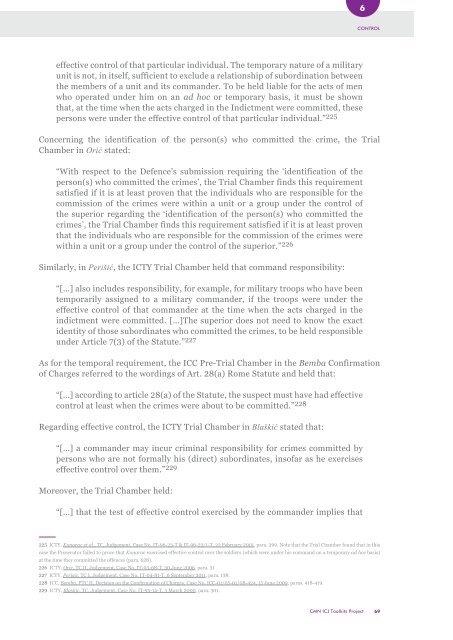Command Responsibility
CMN_ICL_Guidelines_Command_Responsibility_En
CMN_ICL_Guidelines_Command_Responsibility_En
You also want an ePaper? Increase the reach of your titles
YUMPU automatically turns print PDFs into web optimized ePapers that Google loves.
6<br />
CONTROL<br />
effective control of that particular individual. The temporary nature of a military<br />
unit is not, in itself, sufficient to exclude a relationship of subordination between<br />
the members of a unit and its commander. To be held liable for the acts of men<br />
who operated under him on an ad hoc or temporary basis, it must be shown<br />
that, at the time when the acts charged in the Indictment were committed, these<br />
persons were under the effective control of that particular individual.” 225<br />
Concerning the identification of the person(s) who committed the crime, the Trial<br />
Chamber in Orić stated:<br />
“With respect to the Defence’s submission requiring the ‘identification of the<br />
person(s) who committed the crimes’, the Trial Chamber finds this requirement<br />
satisfied if it is at least proven that the individuals who are responsible for the<br />
commission of the crimes were within a unit or a group under the control of<br />
the superior regarding the ‘identification of the person(s) who committed the<br />
crimes’, the Trial Chamber finds this requirement satisfied if it is at least proven<br />
that the individuals who are responsible for the commission of the crimes were<br />
within a unit or a group under the control of the superior.” 226<br />
Similarly, in Perišić, the ICTY Trial Chamber held that command responsibility:<br />
“[…] also includes responsibility, for example, for military troops who have been<br />
temporarily assigned to a military commander, if the troops were under the<br />
effective control of that commander at the time when the acts charged in the<br />
indictment were committed. […]The superior does not need to know the exact<br />
identity of those subordinates who committed the crimes, to be held responsible<br />
under Article 7(3) of the Statute.” 227<br />
As for the temporal requirement, the ICC Pre-Trial Chamber in the Bemba Confirmation<br />
of Charges referred to the wordings of Art. 28(a) Rome Statute and held that:<br />
“[…] according to article 28(a) of the Statute, the suspect must have had effective<br />
control at least when the crimes were about to be committed.” 228<br />
Regarding effective control, the ICTY Trial Chamber in Blaškić stated that:<br />
“[…] a commander may incur criminal responsibility for crimes committed by<br />
persons who are not formally his (direct) subordinates, insofar as he exercises<br />
effective control over them.” 229<br />
Moreover, the Trial Chamber held:<br />
“[…] that the test of effective control exercised by the commander implies that<br />
225 ICTY, Kunarac et al., TC, Judgement, Case No. IT-96-23-T & IT-96-23/1-T, 22 February 2001, para. 399. Note that the Trial Chamber found that in this<br />
case the Prosecutor failed to prove that Kunarac exercised effective control over the soldiers (which were under his command on a temporary ad hoc basis)<br />
at the time they committed the offences (para. 628).<br />
226 ICTY, Oric, TC II, Judgement, Case No. IT-03-68-T, 30 June 2006, para. 31<br />
227 ICTY, Perisic, TC I, Judgement, Case No. IT-04-81-T, 6 September 2011, para. 138.<br />
228 ICC, Bemba, PTC II, Decision on the Confirmation of Charges, Case No. ICC-01/05-01/08-424, 15 June 2009, paras. 418-419.<br />
229 ICTY, Blaskic, TC, Judgement, Case No. IT-95-14-T, 3 March 2000, para. 301.<br />
CMN ICJ Toolkits Project<br />
69


